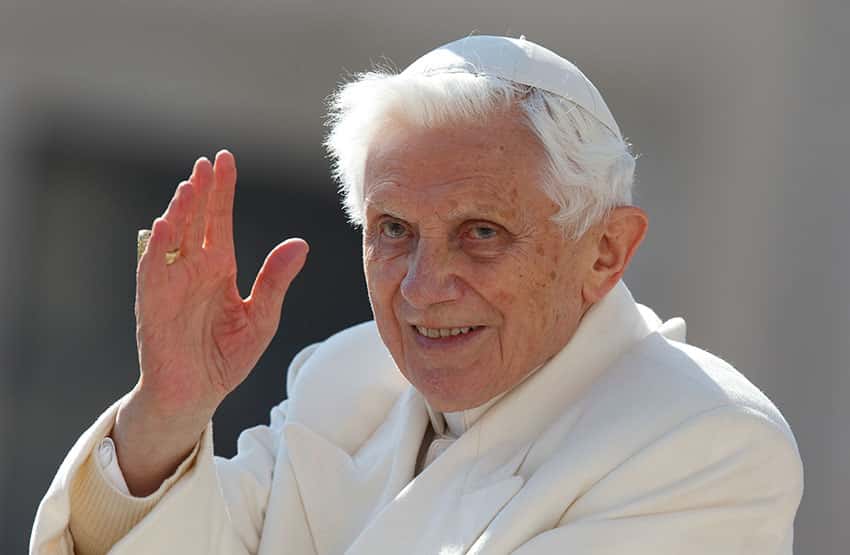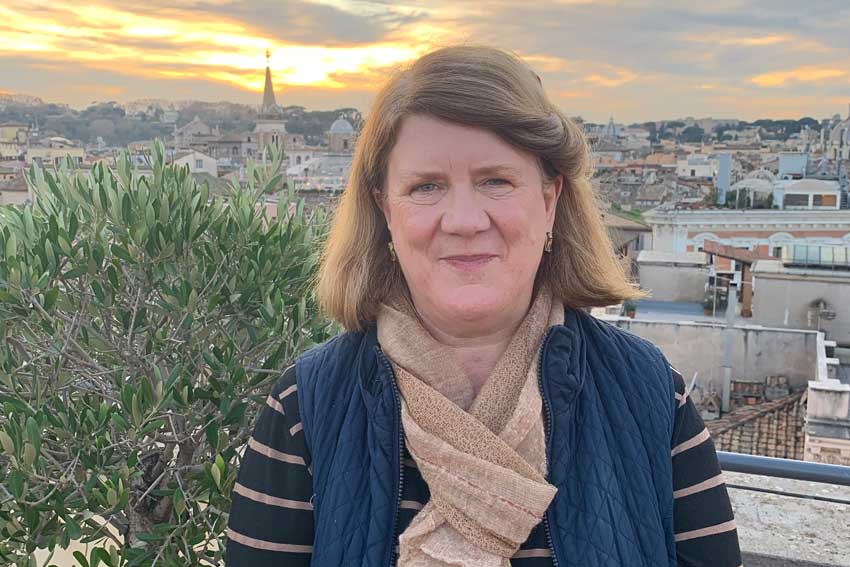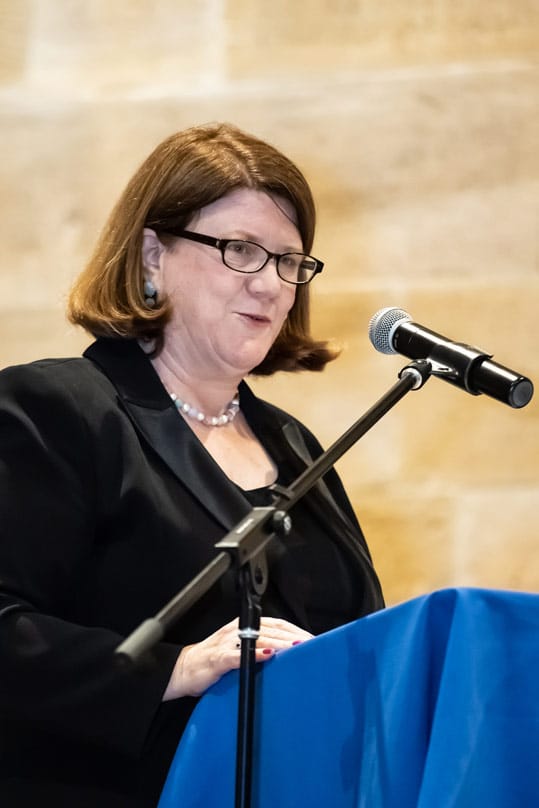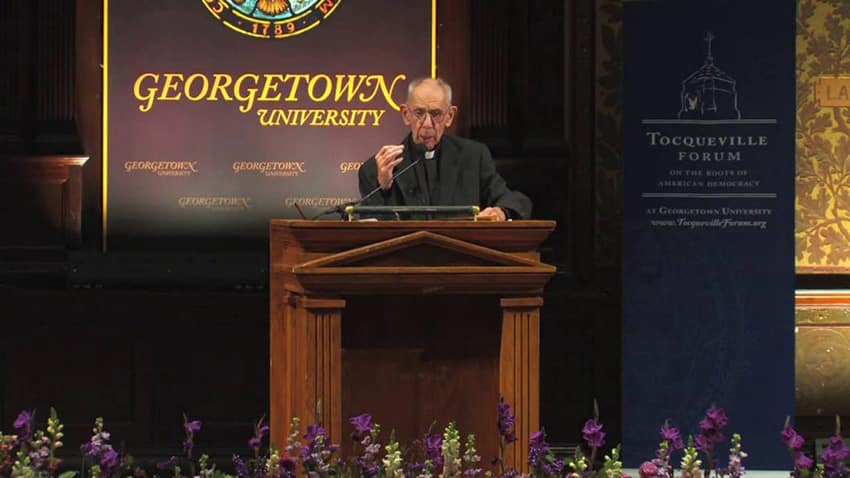
Pope Francis has named University of Notre Dame Australia research professor Dr Tracey Rowland a winner of the 2020 Ratzinger Prize for Theology. In this Q@A with The Catholic Weekly editor Peter Rosengren she shares her reaction to being honoured for her decades of scholarship, influences in her life and work, her research passions, and the five reasons why she holds Pope Emeritus Benedict XVI in such high esteem.
Q. How did you receive the news that you had won the 2020 Ratzinger Prize for Theology?
A. I received an email from the Chairman of the Prize Committee. He informed me that I had been chosen as one of the two winners for 2020 and that the other recipient was a French philosopher. I correctly guessed that the philosopher would be Jean-Luc Marion because Remi Brague, another obvious candidate, has already won the Prize.
Q. Were you surprised to be named as a recipient? Do you know what specific aspect of your work has won you the prize?
A. I was surprised but not totally shocked because I have published quite a lot about the theology of Joseph Ratzinger, including two books that have been translated into other languages.
At the conferral ceremony in November I expect that some reference will be made to my contributions to the theology of culture. Cardinal [Gianfranco] Ravasi was on the selection committee and he is very interested in this subject.
I also gave a lecture at Santa Croce University last November on Ratzinger/Benedict’s ideas on the theology of culture and the auditorium was filled to capacity. It is possible that someone on the selection committee or closely associated with the committee was present at that lecture.
Q. What would you describe as the main thrust of your work over the last two or three decades?
A. Theological anthropology (nature and grace, intellect, memory and will, faith and reason and the imagination, history and ontology), the theology of culture (the faith-culture relationship), and fundamental theology (the building blocks of the Catholic intellectual tradition). I also write historical theology, that is, essays about the history of Catholic ideas, and essays on political philosophy.
My next book is on the ideas of six German Catholic scholars who stood up to the Nazis.
They were the intellectual heroes of the Ratzinger generation of German seminarians.
My earliest studies were in political philosophy, in particular Marxism and Liberalism and the Catholic engagement with those two movements.

I wrote my Master’s dissertation on political philosophy in 1989 while living in Cracow.
This morphed into an interest in the theological anthropology of St John Paul II, including his understanding of the relationship between freedom and culture.
The biggest project on which I am currently working is a Ratzinger Lexicon. This is a large theological dictionary containing 101 short essays, each of around 4,000 words, each on a single aspect of the theology of Joseph Ratzinger/Benedict XVI. There are 84 contributors to the project and the Lexicon will be simultaneously published in English, German and Spanish.
Q. What are your specific theological interests?
A. The relationships between nature and grace, faith and reason, history and ontology and faith and culture.
Q. How would you describe your theological formation?
A. My theological formation could be described as a kind of cocktail that is one part British Radical Orthodoxy, two parts European (especially German) Communio scholarship, with a dash of MacIntyrean-style Thomism (something Scottish in origin). There is also a strong middle-European dimension. Most of my favourite philosophers are Poles, Czechs and Hungarians.
I am a product of the Cambridge Divinity School and the John Paul II Institute that was set up by the late pontiff with its headquarters at the Lateran University. All of my theological studies have taken place in the UK or Rome.
I do however love working at Notre Dame (Australia). My colleagues are faithful Catholics and there is a very strong sense of collegiality which is really only possible when people share the same faith and love the same things.
We have a number of very talented doctoral students so my hope is that within a decade at least some of our graduates will be international names.
Q. Why is Joseph Ratzinger, the theologian and religious thinker, so important to today’s world?
A. I think he has at least five important qualities or gifts:
- He belongs to a generation of Germans that had the highest educational standards in the world. He is multi-lingual, speaks several modern languages, as well as reading classical Greek and Latin and Hebrew, and is across the intellectual history of western civilisation.
- He actually believes the Catholic faith. One can’t always assume this of people on the Church’s payroll.
- When he writes about something theological there is a combination of deep piety with high scholarship. Most people have one or the other, but not both.
- He never glosses over the complexities in any territory but he can explain the complexities so that anyone who has been to university can understand him.
- I would say that he really understands western culture. His understanding of secularism and cultural Marxism is deep. He can therefore write in such a way that young people reading him feel as though he understands the pathologies of the culture into which they have been born.
He gives them the back-story, explaining the moves on the chessboard of the European intelligentsia that got western culture into its current mess and he gives them the remedies, the intellectual antidotes.

Q. Why is he so important to the Church?
A. He is important because both the Church and western culture is in a state of crisis. To get out of any crisis someone needs to do a pathology report on the cause(s) of the problems and to recommend solutions.
The crises are primarily of an intellectual nature and they have secondary effects in the world of culture, spirituality and human relationships.
He is also important because he was a Peritus at the Second Vatican Council and has offered a very Christocentric hermeneutical framework for interpreting the documents of the Council.
When he writes about the Council he writes as someone who helped to draft the documents—he has first-hand knowledge of what happened and why.
Q. What are or have been the major influences in your life?
A. My most important influence was my maternal grandmother, a ‘God, Queen and Country’ High Church Anglican.
I owe my Christian faith to her but I owe my faith in the Catholic Church to some holy nuns who taught me in primary school. Three of them were quite exceptional: Sr Mary Olten who prepared me for my First Communion, Sr Patrice Kennedy who prepared me for my Confirmation and Sr Mary Clotilde Barry who prepared me for life beyond school.
At university I discovered the writings of Fr James V Schall SJ, a Professor of Political Philosophy at Georgetown University. We became friends and I learned more from reading his articles and books than I learned from most of my BA subjects put together.
Fr Schall wrote a book called Another Sort of Learning: Selected Contrary Essays on How Finally to Acquire an Education While Still in College or Anywhere Else. It was very useful!
The one lecturer I had in my undergraduate years who was a really great mentor was Vendulka Kubalkova. She was a third generation Czech intellectual whose father and grandfather had both been professors at the Charles University in Prague.
If I remember correctly she read seven languages, had two doctorates (law and politics) and a degree in music.

She would come to class with her dog and if he fell asleep while we were delivering our tutorial papers she would say that we had bored the dog to sleep.
I can remember actually being worried that if ‘Sambo’ went to sleep while I delivered my paper I would get a low grade for the subject.
When I was leaving home to go to university my parish priest gave me a copy of an article Tony Abbott had written for The Catholic Weekly.
Tony had just won his Rhodes scholarship and so he was invited by the Weekly to offer a list of books he thought Catholics should read before they went to university.
I dutifully took the article, tracked down the books, and spent my summer reading them.
It helped me to understand that there is such a thing as a Catholic intellectual tradition.
My law degree was useful because it taught me a lot about doctrines and how they develop and the principles for their interpretation. I was easily able to transfer those skills to theology.
One final influence I would like to mention is my friend Anna Krohn.
Archbishop Fisher once remarked to me that “Anna is smarter than all of us, certainly the most intellectually creative, if only someone could follow her around with a tape recorder”.
It was Anna who first mentioned the name Balthasar to me and Anna who first showed me a copy of the Communio journal.
The rest is a long history but these were the foundations!
Related articles:
